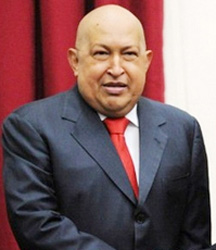CARACAS (Reuters) – An unexpected phone call interrupts a Venezuelan government ceremony for local athletes broadcast live on state TV. The crowd murmurs in excitement, and ministers smile. “It’s the ghost talking!” reverberates the voice of President Hugo Chavez, via loudspeakers, prompting laughter and applause.

“The ghost of Miraflores,” he adds, referring to the Caracas presidential palace where he is convalescing after four rounds of chemotherapy following a June operation in Cuba to remove a baseball-sized cancerous tumour from his abdomen.
As cockerels crow and parrots squawk in the background at Miraflores, the 57-year-old socialist president proceeds to take over the event by telephone and expound to the nation.
Chavez’s self-description as a ghost is apt.
Since the surgery no one knows when, where or how he is going to pop up in public.
Neither does anyone, beyond a small inner circle of doctors and confidants, know the details of his condition.
When he does appear or his voice suddenly booms without warning from the TV, he assures “chavistas”, his supporters, that he will be fit to fight for re-election in twelve months.
Yet both his physical appearance — shaven-headed after chemotherapy, and with a notably swollen face — plus the brevity of his appearances, compared to his famous marathon sessions, seem to undercut that.
Chavez, who travels to Cuba this coming weekend, insists final checks will give him a clean bill of health.
But some now wonder if he will reach the vote, and many are convinced the “Chavismo” movement would not survive his death.
All the talk over Chavez’s health has eclipsed other pressing issues in Venezuela, like untamed crime, soaring prices and constant failures in public services. Those may re-emerge as big factors at the vote on Oct 7, 2012.
The rumour-mill over Chavez’s illness has been in constant overdrive, turning many Venezuelans into pseudo-doctors.
Whenever Chavez disappears from public view for a couple of days, rumours spread like wildfire in the politically-polarized Caribbean nation, fuelled by an official veil of secrecy.
Tossing a baseball in public recently to dispel one report that he was on death’s door, Chavez bristled when an American journalist pressed for more medical details.
“What do you want? That I bring out the tumour to show you what it was? That’s what you want to feed your morbid taste. I won’t satisfy you.”
Chavez said the cancer has not metastasized, or spread.
Some are convinced Chavez is dying from a severe cancer, either of the prostate, colon or bladder. Others believe he has made the whole thing up just to win a few sympathy votes.
One theory making the rounds is that he has a rare form of cancer in a muscle, is suffering from severe anaemia, or irreversible kidney failure.
Plenty of Venezuelans, however, doubt Chavez’s account.
“He’s a magician and has had advisors helping him dissimulate, distract and misinform,” said local pro-opposition journalist Nelson Bocaranda, whose reports on Chavez’s cancer have irked the government. “But I believe that in the end, it’s the head of state himself who has most doubts about it all.”
With no obvious successor, and none of his allies daring to talk in public about the possibility of his exit from the political stage, local media speculate endlessly over the different factions preparing to slug it out for his office.
Financial markets are not excluded from the health debate.
The rumours play havoc on sovereign bond prices with erratic movements tied to every twist and turn in the unfolding saga.
When the Miami newspaper El Nuevo Herald reported last month that Chavez was having emergency treatment for kidney failure, prices jumped, only to fall again hours later when the president threw around a baseball for the cameras.
“Venezuela’s bonds are the most sensitive in Latin America to headlines,” said Nomura Bank analyst Boris Segura.
Chavez’s ratings have risen to near-60 per cent on a sympathy bounce and a full recovery would allow him to present an image of triumph over adversity and restore his aura of invulnerability.
But if he worsens, or goes into the election looking sick, that might play badly with voters who like a strong leader.
Opposition leaders know this may be the best chance in years to unseat him and they will hold a primary vote on Feb 12 to pick a unity candidate to run against him.
They have scrupulously avoided being seen to gloat over Chavez’s illness, but opposition web sites and media have been less disciplined with endless speculation on his health as well as supposed splits among his allies and within the military.
“Everything is part of an opposition strategy to spread chaos in Venezuela. They are trying to damage the president by sowing doubts about his capacity to govern,” said US-Venezuelan lawyer Eva Golinger, a friend of Chavez.
The health issue is the biggest wildcard for the vote.
“If Chavez is fit, he will be the favourite, though not guaranteed,” wrote Luis Vicente Leon, head of Datanalisis pollster, in a column. “But it won’t be easy for him if he has to campaign sick, especially when all opposition candidates will have what he doesn’t: youth, energy and future.”









